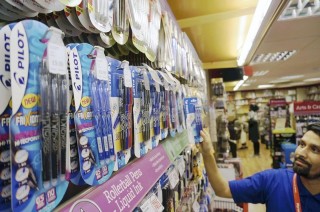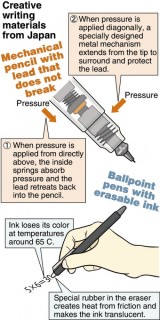Loading
Search
▼ Creative Japan / Writing Utensils Rewrite Classic Assumptions
- Category:Souvenir
This is the fifth and final installment of a series.
A Japanese-designed ballpoint pen has become a worldwide hit thanks to ink that can be erased when a mistake is made.
In a London shopping district, Frixion erasable ink pens from Pilot Corp. are showcased in a display cabinet in front of the registers at a Ryman Stationery store.
Sales this year are up by more than 20 percent from last year. The main customers are between 8 and 14 years old. Sid Ahmed, the store’s 39-year-old manager, whose 13- and 15-year-old kids are avid users, said,
“They’re easy to erase and hard to break, so kids love them.”
Pilot began selling the Frixion in Europe in 2006, a year earlier than in Japan. The company realized that most schoolchildren use pens instead of pencils in Britain and other European countries, and that erasable pens that use chemical reactions to make ink disappear were common.
This observation resulted in a big hit. Frixion’s popularity has spread from Europe to more than 100 countries around the world, and total sales as of the end of 2016 were 1.9 billion units.
How is writing erased? The secret lies in the ink, which researchers began developing more than 40 years ago using hints from autumn leaves.
A Japanese-designed ballpoint pen has become a worldwide hit thanks to ink that can be erased when a mistake is made.
In a London shopping district, Frixion erasable ink pens from Pilot Corp. are showcased in a display cabinet in front of the registers at a Ryman Stationery store.
Sales this year are up by more than 20 percent from last year. The main customers are between 8 and 14 years old. Sid Ahmed, the store’s 39-year-old manager, whose 13- and 15-year-old kids are avid users, said,
“They’re easy to erase and hard to break, so kids love them.”
Pilot began selling the Frixion in Europe in 2006, a year earlier than in Japan. The company realized that most schoolchildren use pens instead of pencils in Britain and other European countries, and that erasable pens that use chemical reactions to make ink disappear were common.
This observation resulted in a big hit. Frixion’s popularity has spread from Europe to more than 100 countries around the world, and total sales as of the end of 2016 were 1.9 billion units.
How is writing erased? The secret lies in the ink, which researchers began developing more than 40 years ago using hints from autumn leaves.
The Frixion uses a special Pilot-developed ink that loses its color at temperatures around 65 C. The pen relies on a special rubber on the back end of the pen to create heat from friction and make the ink translucent. Because it uses temperature change to make the ink invisible, it neither produces eraser crumbs nor leaves traces of writing.
Naomi Watanabe, 41, a member of the writing utensil planning group in charge of the Frixion series, said that they “tried more than a thousand times before making an ink suitable for the pen.”
A mechanical pencil with lead that does not break is also popular abroad.
Zebra Co.’s DelGuard mechanical pencil was developed with the sole purpose of solving mechanical pencils’ largest deficiency: broken leads.
Mechanical pencils make it easy to write small characters, but applying just a small amount of pressure can cause the lead to shatter. The DelGuard’s two springs absorb pressure applied from all directions, and a specially designed metal mechanism extends from the tip to surround the lead and prevent breakage.
Ordinary mechanical pencils contain about 10 parts, but the DelGuard has 22. Yosuke Segawa, 32, a member of Zebra’s product development department, proudly said, “We created a product with lead that we can confidently say will not break.”
The company recognized the needs of consumers in South Korea and elsewhere in Asia, which are known for their fierce examination competition. Released in 2014, global sales of the DelGuard have reached 10 million units.
Japanese writing utensils shatter assumptions, and may change the way the world studies.
Naomi Watanabe, 41, a member of the writing utensil planning group in charge of the Frixion series, said that they “tried more than a thousand times before making an ink suitable for the pen.”
A mechanical pencil with lead that does not break is also popular abroad.
Zebra Co.’s DelGuard mechanical pencil was developed with the sole purpose of solving mechanical pencils’ largest deficiency: broken leads.
Mechanical pencils make it easy to write small characters, but applying just a small amount of pressure can cause the lead to shatter. The DelGuard’s two springs absorb pressure applied from all directions, and a specially designed metal mechanism extends from the tip to surround the lead and prevent breakage.
Ordinary mechanical pencils contain about 10 parts, but the DelGuard has 22. Yosuke Segawa, 32, a member of Zebra’s product development department, proudly said, “We created a product with lead that we can confidently say will not break.”
The company recognized the needs of consumers in South Korea and elsewhere in Asia, which are known for their fierce examination competition. Released in 2014, global sales of the DelGuard have reached 10 million units.
Japanese writing utensils shatter assumptions, and may change the way the world studies.
- May 25, 2017
- Comment (0)
- Trackback(0)



